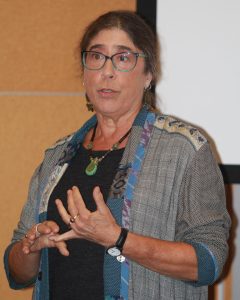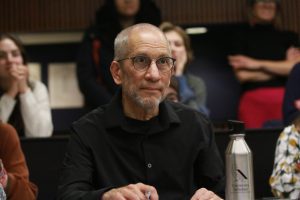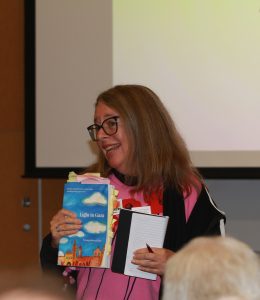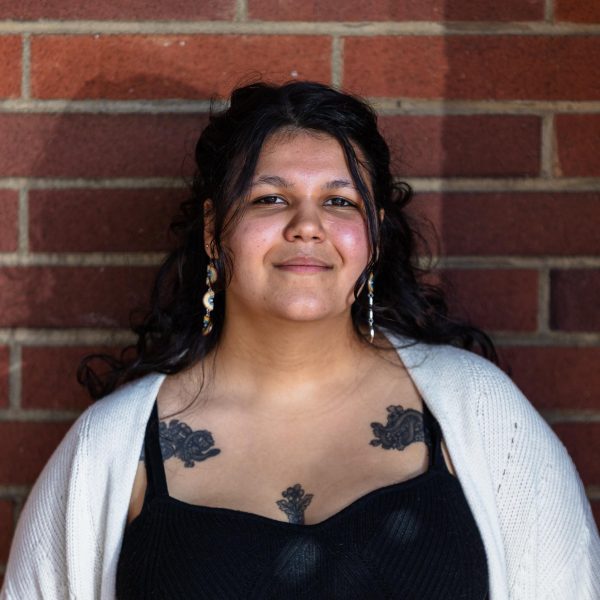
Every seat was taken in Eaton Hall on Wednesday, Oct. 4, as Yousef Aljmal and Dr. Alice Rothchild spoke on Gaza’s humanitarian crisis. Students and faculty alike spent a lunch break expanding their horizons and learning about the personal experiences and medical disparity of citizens in Gaza.
The Seattle Pacific University panel took place before recent events in Israel and Gaza: on Saturday, Oct. 7, Hamas, the militant group which precedes over the Gaza Strip, executed an attack on 22 Israeli towns, taking at least 150 Israeli citizens hostage. Later Saturday, the Israeli military announced war on Hamas with air strikes. The current total estimated death toll is 1,100, both Israeli and Palestinian.
“AFSC mourns with those who have lost loved ones and all who are suffering. We will continue to work for the changes needed to end this violence and build a just and lasting peace,” read the statement of Jennifer Bing’s, national director of the Palestine Activism Program. “Military action will accomplish nothing but death and destruction.”
Three days before the recent altercations in the Middle East, Yousef Aljamal spoke on militarization within the region and complications due to severe travel restrictions. Aljamal shared before the panel what he hopes American citizens would be more aware of.
“I am here to challenge the dehumanization of the Palestinian people; reducing us to numbers and statistics. [I am here to] share our story because personal stories matter to people,” said Aljamal, who grew up in the Gaza Strip. “This issue is important for all Americans, especially [because] U.S. aid given to Israel is being used to cage Palestinians in Gaza.”
The panel opened with retired obstetrician gynecologist, Dr. Alice Rothchild, who spoke on the medical impact of Israel’s military occupation. Rothchild had been invited to work in Gaza four times by the Gaza Community Mental Health Program, and explained to the audience the severe lack of resources essential to life.
“We know that water pollution is one of the main causes of morbidity and mortality in Gaza. It’s partly due to over-pumping of the aquaphor and lack of ability to repair because of the repeated bombings and restrictions,” Rothchild said. “As of now, something like 97% of the water is not drinkable.”
Since the travel restrictions are so heavily enforced within Gaza, many medical services and diagnosis, which are on the whole readily available in the U.S., are not accessible, according to Rothchild. Additionally, doctors and medical professionals cannot travel outside of the region to continue their education or obtain current technology.

The lack of medical resources within Gaza has led to a lower five year survival rate among breast cancer patients, according to Rothchild and a 2016 article by The Guardian citing a Harvard medical school study. While the medical study is a few years old, Rothchild said that it is still very relevant to the state of Gaza medicine. Aljamal and his family lived in an inhuman reality a majority of the world is not aware of.
“I grew up in ‘Block A’, which used to be a British prison during the first World War, it is literally like a prison,” Aljamal said. “So you can imagine the amount of stress and surveillance. We always had Israeli soldiers patrolling our neighborhood.”
These conditions are not unique to Palestinians, rather a striking example of the living conditions under Israeli military occupation. Yet the community remains resilient. Historically large and powerful empires such as the empire of Alexander the Great and Britain tried to conquer Gaza, each only succeeding in their third attempt.
“People in Gaza do not give up easy, and this is proven over history,” said Aljamal.
Nonetheless, Palestinians are among the most educated communities in the world, simply held to the limited resources within the occupation.

“We are very proud of who we are as Palestinians in Gaza. It’s a human made humanitarian crisis. We are not a charity case – 95.8 percent of people are literate, many people, thousands, have PhDs,” Aljamal said.
Dr. Kimberly Segall, department chair for the social justice and cultural studies program at SPU, hopes that the panel will inspire students to take legislative action. The U.S. provides military aid to Israel, which Segall implores students to think critically about.
“You need to vote,” Segall said. “There is fear by our politicians that they won’t be elected if they stand up to the militarization, which is bad for Israelis, Palestinians and the U.S.”
The panel held a common message of both resilience and hope in the humanitarian crisis in Gaza: hope for an end to the siege and an end of the people’s ‘nakba,’ the Arabic word for catastrophe. The nakba is commonly used to refer to the expulsion of Palestinians and their suffering.
“These sad stories are important to relate to our experience. I don’t want you to remember us as victims,” Aljamal said. “We are proud of who we are and we will keep fighting until we get our full rights and equality.”

















































































